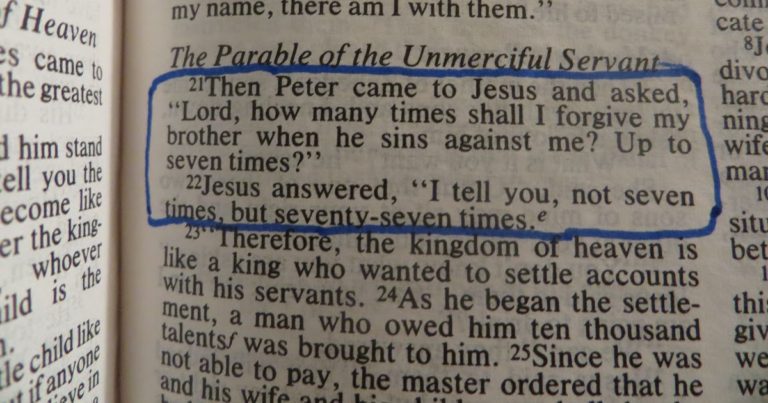Christians are quite familiar with the biblical phrase seventy times seven (KJV). These are words spoken by Jesus himself in response to a question from the apostle Peter “Lord, how often will my brother sin against me, and I forgive him? As many as seven times?” (Matt. 18:21, ESV). And of course, Jesus responded “I do not say to you seven times, but seventy-seven times.” (Matt. 18:22, ESV).
The term seventy-seven times or seventy times seven has been variously interpreted. One interpretation is that the product of 70 x 7 or 490 refers to the number of years the Jews had spent in captivity and slavery. But this interpretation is erroneous and falls under its own weight. If Jesus intended his response to be taken as a specific number, namely, 490, then we would have to forgive our brother 490 times, nothing less and nothing more. Jesus didn’t say up to 490 and he didn’t say more than 490, he said 490.
So, if the cardinal value of the number 490 is the essential point of what Jesus is saying, which it is not, then Jesus has violated the doctrine of reductio ad absurdum (Latin: “reduction to absurdity”), also known as argumentum ad absurdum (Latin: “argument to absurdity”). This doctrine stands for the idea that when you take a proposition to its logical conclusion, the result is an absurdity. And that’s precisely what we have here.
This number that Jesus speaks is not spoken in the sense of a cardinal number, that is, a number intended to express a quantity. He is instead speaking in the ordinal sense, which is stating order, priority, position, rank or as in this case magnitude. Jesus is also speaking using the literary technique known as hyperbole. Jesus is using a large number in the ordinal sense to make a point that there are no limits and no boundaries to the forgiveness of a repentant fellow Christian.
We find support for this ordinal number interpretation when we look to Luke’s description of the same event in Luke 17:3-4 where it states “Pay attention to yourselves! If your brother sins, rebuke him, and if he repents, forgive him, and if he sins against you seven times in the day, and turns to you seven times, saying, “I repent, you must forgive me.” Luke doesn’t mention the number 490 but he makes the same point. If Jesus had been using the number 490 in the cardinal sense to indicate a specific quantity, then Luke would not have stated this doctrine of unlimited forgiveness in this way; he would have used the number 490.
Jesus is teaching that if a fellow Christian repents of his sin against you, no matter how many times he sins against you and repents, you must forgive him. Jesus is teaching limitless, boundless, forgiveness which is precisely what we get from God. Christians are called to forgive following the example of Jesus Christ (Eph. 4:32).

